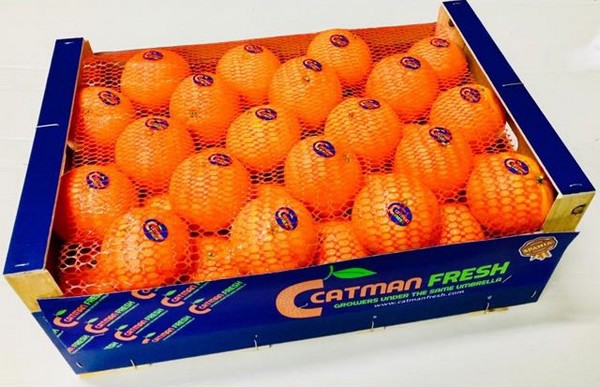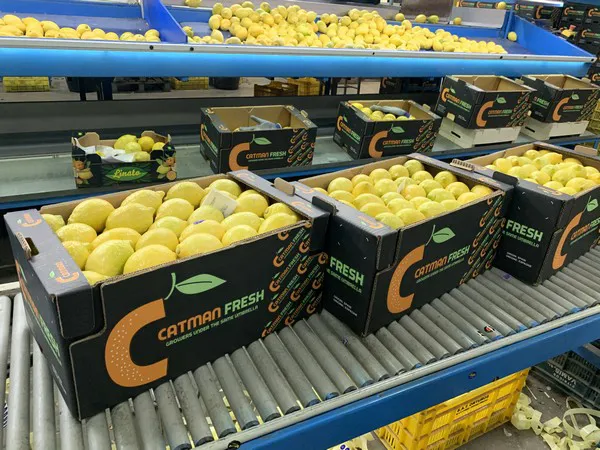With the mandarin harvest now over, the Spanish citrus season is moving forward with late oranges and Verna lemons. Although there has been a slight recovery in the demand for oranges, the impossibility of exporting lemons to Canada as of this week is a cause for concern. At the same time, the first stone fruit shipments, for which there is a higher demand than for citrus, are also starting to arrive.
"Last year, the citrus season finished with sky-high prices due to the panic generated by the pandemic amongst consumers, which caused sales to double and even triple at large retailers," says Sergio Orobal, manager of Catman Fresh. This upward trend has continued only in the field this year, especially in the second part of the campaign."
Tough competition for Spanish oranges from Egypt
There are about 2 months left of Spanish orange sales. At the moment, they are working with Navel Powels, Chislets and Lanes, which are already stored in the chambers, as well as Valencias.

"Egypt's influence on the Spanish orange campaign has been very strong this year, especially in those markets that do not appreciate quality as much. Some batches of Spanish oranges have been sold for up to 50 cents a kilo at origin, while Egypt has offered them for between 45 and 50 cents a kilo in the market. Selling for more than 1 Euro per kilo has been difficult and with such prices there have been no profits. Some markets, such as the Middle East, stopped importing Spanish oranges while Egyptian produce was available, at least for two months. It has only been two weeks since shipments to these markets started again," says Sergio Orobal.
The entry of lemons from the southern hemisphere is leaving Spain out of the Canadian market
Lemon production is growing in Spain due to the expansion of the acreage, motivated by the profitable prices obtained for several consecutive seasons in previous years. The Verna season, whose yields are high this year, is already in full swing.

"A good Verna lemon production is expected. Their cultivation has changed a lot compared to 10 years ago and production volumes are more stable thanks to improvements being made in the field. The production is becoming more homogeneous," says Sergio Orobal.
In addition to marketing in Europe, Catman Fresh exports to overseas markets such as the United Arab Emirates and Canada, among others. The exporter points out that Spanish lemon shipments to Canada have grown by around 35% so far, due to there being less competition from Californian lemons. However, shipments to this market will stop next week, as there is already supply of South African and Argentinian lemons. "Freight rates for southern hemisphere lemons are considerably lower than what we are paying. For us, they have doubled due to the lack of available equipment. Canada will stop taking between 500 and 700 tons of Spanish lemons per week. These volumes will now go to Europe, putting increasing pressure on the supply."
Last mandarin stocks for programs
The Tango, Nadorcott and Orri mandarin productions have been lower than expected and prices at origin have soared due to speculation. "This has not been in line with the market, where the demand and prices have been normal and failed to compensate for this year's extra costs," says the manager of this Alicante-based company. At this time, practically all mandarins have already been harvested. Almost all the production that remains in Spain, which is small, is stored in chambers to meet some programs with supermarket chains and will run out in about a month, paving the way for the mandarins from the southern hemisphere."
"Eager to start with stone fruit."
The Alicante-based company also works with stone fruit in the summer months and will soon have supply. "It is going to be an interesting year, as frosts have reduced the production in Spain, France, Italy, Greece, Turkey and Hungary. Temperatures are colder than usual this spring, with intermittent rainfall every week. This makes fruit ripening a bit slower, while the market is already eager to start."
For more information:
Sergio Orobal, Managing Director
Catman Fresh
Camino de Iryda, s/n
03190 Pilar de la Horadada, Alicante. Spain
+34 966 747 902
sergio@catmanfresh.com
www.catmanfresh.com
